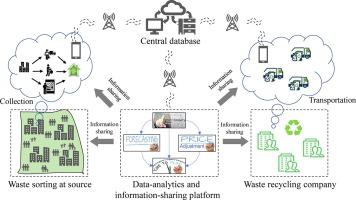Waste Management ( IF 7.1 ) Pub Date : 2021-02-12 , DOI: 10.1016/j.wasman.2021.01.030 Jieyu Zhou , Peng Jiang , Jin Yang , Xiao Liu

|
Household waste recycling is a significant challenge for society. Cities worldwide have been exploring how to reduce waste through recycling. Incentive mechanism is one of the promising measures to improve the participation of residents in waste recycling activities. However, several defects have been observed in the incentive-based waste recycling systems: (1) inefficient allocation of resources in recycling services, (2) deficient systems lacking future planning, and (3) limitations in circulating responsive feedback amongst stakeholders. For overcoming these defects, a smart incentive-based recycling system is designed using the Internet of Things and data analysis technologies. Four key components in the designed system—namely, amount pattern discovery, price adjustment suggestion, waste-collection amount forecasting, and information sharing amongst stakeholders—assist in constructing a smarter system to enhance waste recycling. A basic incentive-based recycling system in Shanghai, with data on 19 specific recyclable items from 21 August 2018 to 20 March 2019, was improved to demonstrate the effectiveness of the designed system. For the case of a pilot community, the recyclable waste-collection amount increased 229.3%, but the weekly pattern of collection amount got imbalanced, especially at weekends. The weekly pattern analyses suggested adjusting the pricing for cardboard, strawboard, plastic bottles, and old clothing amongst the six identified items (i.e. taking ~80.0% by weight) to balance the collection amount and allocate resources better for waste-collection operations. The two-month trend analysis and fortnight forecasting help to make plans rationally for recycling businesses. Under the new information-sharing platform, stakeholders could collaborate smoothly in household waste recycling and reduction.
中文翻译:

设计一种基于奖励的智能回收系统,用于家庭可回收废物
生活垃圾的回收对社会是一项重大挑战。世界各地的城市一直在探索如何通过回收来减少废物。激励机制是提高居民参与废物回收利用活动的有希望的措施之一。但是,在基于激励的废物回收系统中发现了一些缺陷:(1)回收服务中资源的分配效率低下;(2)缺乏未来计划的缺陷系统;(3)在利益相关者之间循环响应反馈的局限性。为了克服这些缺陷,使用物联网和数据分析技术设计了一个基于激励的智能回收系统。设计系统中的四个关键组成部分,即数量模式发现,价格调整建议,废物收集量预测,利益相关者之间的信息共享-协助构建更智能的系统以增强废物回收利用。上海市基本的基于奖励的回收系统得到了改进,其中包含2018年8月21日至2019年3月20日期间19种特定可回收物品的数据,以证明设计系统的有效性。对于试点社区而言,可回收废物的收集量增加了229.3%,但每周的收集量模式变得不平衡,尤其是在周末。每周模式分析建议在六个确定的项目(即占重量的约80.0%)之间调整纸板,草板,塑料瓶和旧衣物的价格,以平衡收集量并更好地分配资源以进行废物收集操作。为期两个月的趋势分析和两周的预测有助于合理地制定回收业务计划。在新的信息共享平台下,利益相关者可以在家庭废物的回收和减少方面进行顺利的合作。











































 京公网安备 11010802027423号
京公网安备 11010802027423号